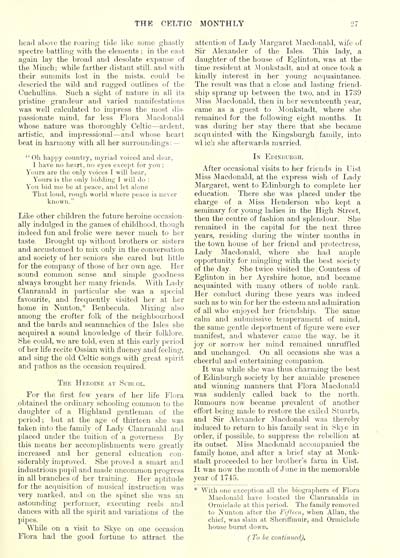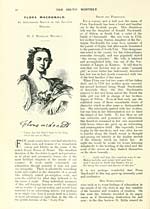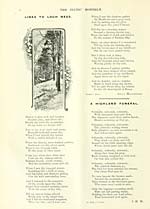Blair Collection > Celtic monthly > Volume 5, 1897
(47)
Download files
Complete book:
Individual page:
Thumbnail gallery: Grid view | List view

THR CELTIC MONTHLY
hoail above the roaring Iklo like suiuc gbastly
spectre battling with the elements : in the east
again lay the broad and desolate expanse of
the Minch: while farther distant still, and with
their summits lost in the mists, could be
descried the wild and rugged outlines of the
Cuchullins, Such a sight of nature in all its
pristine grandeur and varied manifestations
was well calculated to impress the most dis-
passionate mind, far less Flora Macdonald
whose nature was thoroughly Celtic — ardent,
artistic, and imj^ressional — and whose heart
beat in harmony with all her surroundings : —
" Oh happy country, myriad voiced and dear,
I have no heart, no eyes except for you ;
Yours are the only voices I will hear.
Yours is the only bidding I will do :
You bid me be at peace, and let alone
That loud, rough world where peace is never
known."
Like other children the future heroine occasion-
ally indulged in the games of childhood, though
indeed fun and frolic were never much to her
taste. Brought up without brothers or sisters
and accustomed to mix only in the conversation
and society of her seniors she cared but little
for the company of those of her own age. Her
sound common sense and simple goodness
always brought her many friends. With Lady
Clanranald in particular she was a special
favourite, and frequently visited her at her
home in Nuuton,* Benbecula. Mixing also
among the crofter folk of the neighbourhood
and the bards and seannachies of the Isles she
acquired a sound knowledge of their folklore.
She could, we are told, even at this early period
of her life recite Ossian with fluency and feeling,
and sing the old Celtic songs with great spirit
and pathos as the occasion required.
The Heroine at Schcol.
For the first few years of her life Flora
obtained the ordinary schooling common to the
daughter of a Highland gentleman of the
period ; but at the age of thirteen she was
taken into the family of Lady Clanranald and
placed under the tuition of a governess By
this means her accomplishments were greatly
increased and her general education con-
siderably improved. She proved a smart and
industrious pupil and made uncommon progress
in all branches of her training. Her aptitude
for the acquisition of musical instruction was
very marked, and on the sjiinet she was an
astounding performer, executing reels and
dances with all the spirit and variations of the
pipes.
While on a visit to Skye on one occasion
Flora had the good fortune to attract the
attentii>u of Lady iMargaret Macdonald, wife of
Sir Alexander of the Isles. This lady, a
daughter of the house of Eglinton, was at the
time I'esident at Monkstadt, and at once took a
kindly interest in her young acquaintance.
The result was that a close and lasting: friend-
ship sprang up between the two. and in 1739
-Miss iMacdonald, then in her seventeenth year,
came as a guest to Monkstadt, where she
remained for the following eight months. It
was during her stay there that she became
acqu tinted with the Kingsburgh family, into
wLich she afterwards married.
In Edinjjukgh. .
After occasional visits to her friends in Uist
Miss Macdonald, at the express wish of Lady
Margaret, went to Edinburgh to complete her
education. There she was placed under the
charge of a Miss Henderson who kept a
seminary for young ladies in the High Street,
then the centre of fashion and splendour. She
remained in the capital for the next three
years, residing during the winter months in
the town house of her friend and i^rotectress,
Lady Macdonald, where she had ample
opportunity for mingling with the best society
of the day. She twice visited the Countess of
Eglinton in her Ayrshire home, and became
acquainted with many others of noble rank.
Her conduct during these years was indeed
such as to win for her the esteem and admiration
of all who enjoyed her friendship. The same
calm and submissive temperament of mind,
the same gentle deportment of figure were ever
manifest, and whatever came the way, be it
joy or sorrow her mind remained unruffled
and unchanged. On all occasions she was a
cheerful and entertaining companion.
It was while she was thus charming the best
of Edinburgh society by her amiable presence
and winning manners that Flora Macdonald
was suddenly called back to the north.
Rumours now became jjrevalent of another
effort being made to restore the exiled Stuarts,
and Sir Alexander Macdonald was thereby
induced to return to his family seat in Skje in
order, if possible, to suppress the rebellion at
its outset. Miss Macdonald accompanied the
family home, and after a brief stay at Monk-
stadt proceeded to her brother's farm in Uist.
It was now the month of June in the memorable
year of 1745.
* With one exception all the biographers of Flora
Macdonald have located the Clanranalds in
Ormiclade at this period. The family removed
to Nunton after the Fifteen, when Allan, the
chief, was slain at Sheritfmuir, and Ormiclade
house burnt down.
(Tu be continued).
hoail above the roaring Iklo like suiuc gbastly
spectre battling with the elements : in the east
again lay the broad and desolate expanse of
the Minch: while farther distant still, and with
their summits lost in the mists, could be
descried the wild and rugged outlines of the
Cuchullins, Such a sight of nature in all its
pristine grandeur and varied manifestations
was well calculated to impress the most dis-
passionate mind, far less Flora Macdonald
whose nature was thoroughly Celtic — ardent,
artistic, and imj^ressional — and whose heart
beat in harmony with all her surroundings : —
" Oh happy country, myriad voiced and dear,
I have no heart, no eyes except for you ;
Yours are the only voices I will hear.
Yours is the only bidding I will do :
You bid me be at peace, and let alone
That loud, rough world where peace is never
known."
Like other children the future heroine occasion-
ally indulged in the games of childhood, though
indeed fun and frolic were never much to her
taste. Brought up without brothers or sisters
and accustomed to mix only in the conversation
and society of her seniors she cared but little
for the company of those of her own age. Her
sound common sense and simple goodness
always brought her many friends. With Lady
Clanranald in particular she was a special
favourite, and frequently visited her at her
home in Nuuton,* Benbecula. Mixing also
among the crofter folk of the neighbourhood
and the bards and seannachies of the Isles she
acquired a sound knowledge of their folklore.
She could, we are told, even at this early period
of her life recite Ossian with fluency and feeling,
and sing the old Celtic songs with great spirit
and pathos as the occasion required.
The Heroine at Schcol.
For the first few years of her life Flora
obtained the ordinary schooling common to the
daughter of a Highland gentleman of the
period ; but at the age of thirteen she was
taken into the family of Lady Clanranald and
placed under the tuition of a governess By
this means her accomplishments were greatly
increased and her general education con-
siderably improved. She proved a smart and
industrious pupil and made uncommon progress
in all branches of her training. Her aptitude
for the acquisition of musical instruction was
very marked, and on the sjiinet she was an
astounding performer, executing reels and
dances with all the spirit and variations of the
pipes.
While on a visit to Skye on one occasion
Flora had the good fortune to attract the
attentii>u of Lady iMargaret Macdonald, wife of
Sir Alexander of the Isles. This lady, a
daughter of the house of Eglinton, was at the
time I'esident at Monkstadt, and at once took a
kindly interest in her young acquaintance.
The result was that a close and lasting: friend-
ship sprang up between the two. and in 1739
-Miss iMacdonald, then in her seventeenth year,
came as a guest to Monkstadt, where she
remained for the following eight months. It
was during her stay there that she became
acqu tinted with the Kingsburgh family, into
wLich she afterwards married.
In Edinjjukgh. .
After occasional visits to her friends in Uist
Miss Macdonald, at the express wish of Lady
Margaret, went to Edinburgh to complete her
education. There she was placed under the
charge of a Miss Henderson who kept a
seminary for young ladies in the High Street,
then the centre of fashion and splendour. She
remained in the capital for the next three
years, residing during the winter months in
the town house of her friend and i^rotectress,
Lady Macdonald, where she had ample
opportunity for mingling with the best society
of the day. She twice visited the Countess of
Eglinton in her Ayrshire home, and became
acquainted with many others of noble rank.
Her conduct during these years was indeed
such as to win for her the esteem and admiration
of all who enjoyed her friendship. The same
calm and submissive temperament of mind,
the same gentle deportment of figure were ever
manifest, and whatever came the way, be it
joy or sorrow her mind remained unruffled
and unchanged. On all occasions she was a
cheerful and entertaining companion.
It was while she was thus charming the best
of Edinburgh society by her amiable presence
and winning manners that Flora Macdonald
was suddenly called back to the north.
Rumours now became jjrevalent of another
effort being made to restore the exiled Stuarts,
and Sir Alexander Macdonald was thereby
induced to return to his family seat in Skje in
order, if possible, to suppress the rebellion at
its outset. Miss Macdonald accompanied the
family home, and after a brief stay at Monk-
stadt proceeded to her brother's farm in Uist.
It was now the month of June in the memorable
year of 1745.
* With one exception all the biographers of Flora
Macdonald have located the Clanranalds in
Ormiclade at this period. The family removed
to Nunton after the Fifteen, when Allan, the
chief, was slain at Sheritfmuir, and Ormiclade
house burnt down.
(Tu be continued).
Set display mode to: Large image | Transcription
Images and transcriptions on this page, including medium image downloads, may be used under the Creative Commons Attribution 4.0 International Licence unless otherwise stated. ![]()
| Early Gaelic Book Collections > Blair Collection > Celtic monthly > Volume 5, 1897 > (47) |
|---|
| Permanent URL | https://digital.nls.uk/75851511 |
|---|
| Shelfmark | Blair.57 |
|---|---|
| Additional NLS resources: | |
| Attribution and copyright: |
|
| Description | A selection of books from a collection of more than 500 titles, mostly on religious and literary topics. Also includes some material dealing with other Celtic languages and societies. Collection created towards the end of the 19th century by Lady Evelyn Stewart Murray. |
|---|
| Description | Selected items from five 'Special and Named Printed Collections'. Includes books in Gaelic and other Celtic languages, works about the Gaels, their languages, literature, culture and history. |
|---|

